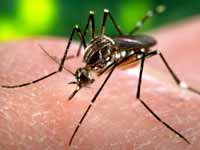UNITED NATIONS (AP) - Rising food prices will push the number of hungry people in the world over one billion next year, a U.N. expert said Monday.
The U.N. Food and Agriculture Organization reported in September that at least 925 million people are hungry in the world today, compared with 848 million between 2003 and 2005, said Olivier De Schutter, the U.N. Human Rights Council's independent expert on the right to food.
"But the data relates to the beginning of 2008, and since then the estimate is that at least 44 million more people have become hungry,'' he said. "So we are now closer to the billion _ and with a bit more efforts we'll arrive at the billion by next year.''
De Schutter told reporters after briefing the U.N. General Assembly's human rights committee that rising prices and increasing hunger are driving the world "far away'' from achieving the U.N. goal of reducing extreme poverty by half by 2015.
"The situation of hunger in the world is alarming,'' said de Schutter, a law professor at the University of Louvain in Belgium and currently a visiting professor at Columbia University's Law School in New York.
"The prices of food commodities on international markets have been going down since they reached a peak in June 2008, when the level of real food prices was 64 percent above their levels of 2002,'' he said. "But prices on domestic markets remain at historically high levels.''
In many countries, especially developing nations that import food, he said, "the brutal increase in prices in 2007 and the first half of 2008 has left severe marks on the poorest households.''
Families have reduced the quantity of food they eat and switched to poorer diets, and they have cut back on health care and schooling, "leading to irreparable damage to the health and education of millions of children,'' de Schutter said.
But he said the food crisis has also provided governments and international agencies with the opportunity to help those who spend the largest proportion of their family budgets on food and are most in need _ small farmers, landless laborers, herdsmen, fishermen and the urban poor.
The real challenge, de Schutter said, is ensuring that increased production will raise the incomes of the poorest "rather than simply increase the quantity of agricultural commodities available for those who can pay.''
Small farmers should be helped to produce more while being protected from the consequences of volatile international prices and the risks of unfair competition from agricultural producers in industrialized countries who are massively subsidized, de Schutter said.
"The urban poor should be helped by social safety nets, and cash-for-work or food-for-work programs, which increase their purchasing power and help them to cope with periods of higher prices,'' he said. - AP
Earth becoming a disease hot spot : The warming earth is making us sick. Rising temperatures, frequent floods and prolonged droughts are ideal conditions for infectious diseases to spread. "Global warming is fuelling epidemics in areas which are unprepared. We're seeing the emergence of new diseases around the world. Old diseases are also coming back with a vengeance," Climate change has dramatically changing infection trends.
DENGUE DEATH CASES INCREASES BY 65% IN 2010
SAVE THE WORLD - STOP GLOBAL WARMING

Either You're With Me or You're Against Me in Stopping Global Warming!
Global Warming Articles
Let's Go Green & Save The World : Mentor Gemilang
The Truth Hurts - Truth is such a rare thing, it is delighted to tell it.

You can fool some of the people all of the time, and all of the people some of the time, but you can not fool all of the people all of the time.
Most truths are so naked that people feel sorry for them and cover them up, at least a little bit.
Truth always rests with the minority, and the minority is always stronger than the majority, because the minority is generally formed by those who really have an opinion, while the strength of a majority is illusory, formed by the gangs who have no opinion
Let's Go Green - Mentor Gemilang 1 - Visitors from 90 Countries
LATEST NEWS
Are u protected against Influenza A(H1N1)?
Repentance (At Taubah)
We can never be perfect since even prophets have at times made mistakes. Repentance means to abandon one's rebelliousness and arrogance before God and to stop deliberately disregarding His commandments without feeling any shame. Repentance also means to humbly hope for the mercy of God and to fear His judgment while doing the best one can to fulfill divine wishes within the limits of one's human weaknesses.


